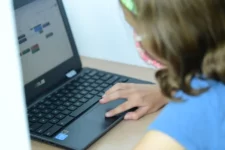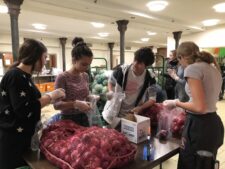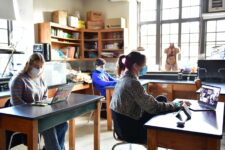Early in the pandemic, Jon Alschuler, Fieldston Middle Assistant Principal for Student Life, and Arhm Choi Wild, Fieldston Middle and Fieldston Upper Diversity Coordinator, came up with the idea of an archival project documenting service work being done by the Fieldston Middle Community as part of the Middle School Day of Action.
Alschuler and Wild joined forces with Liz J. Fernández, Assistant Head of School for Ethical Education & Social Impact, and Shelley Topping-Omodunbi, Director of Public Partnerships, recognizing that students, parents, and alumni across all four of ECFS’s divisions were doing extraordinary things to help those in need. “Why not capture that,” Fernández thought, “and celebrate the level of compassion, hope, and understanding within our community?”
Together, the team launched the ECFS ACTS (Achieving Community Together = Strength) archival project — which includes videos, pictures, and written summaries — to document the staggering amount of service work the ECFS community is performing.
Though the School has temporarily paused its service learning graduation requirement to avoid putting students at risk, that hardly means service learning has stopped — both within Community Service Learning courses and as self-directed, non-credit efforts. “There are students who are very passionate about this work and have continued to commit themselves to the work, so we encourage and hold space for these opportunities to flourish,” Topping-Omodunbi says.
Below is just a sampling of the many ways in which the ECFS community has responded to COVID-19 with acts of service.
Delivering groceries to the most vulnerable
At the beginning of the crisis, Jordan K. ’21 offered to pick up groceries for her neighbors who were particularly vulnerable. As she began making multiple daily deliveries, she recognized the need was greater than what one person could provide. Jordan launched NYC Quaranteens and built a website to allow teen volunteers to drop off and be reimbursed for food deliveries to elderly and at-risk individuals — contactlessly, and without imposing a delivery fee. “This is a simple but very meaningful way to keep our community safe and do our part,” she says. “I feel like I have an important purpose.”
Story time for underprivileged students
For three years, Maya J. ’21 and her classmates in the Community Service Advisory Board class have partnered with Fresh Youth Initiatives (FYI), an after school program that supports underprivileged students, to offer academic support to Kindergarteners through 5th Graders every Thursday afternoon. Since social distancing measures began, Maya and her group have recorded themselves reading children’s books, which FYI then shares with their students.
Maya and the CSAB students are looking to expand their efforts — and are working with FYI to continue their involvement. “Staying home and not doing much while the world is facing hardships is difficult, as you want to go out and do something to help,” she says, “However, service working remotely has allowed us to continue serving while staying home and staying safe.”
Providing essentials to the homeless
Amani C. ‘22 and Timia M. ’22’s CSAB class partnered with Midnight Run, an organization dedicated to providing food and other necessities to the homeless population in New York City. Their class started a virtual drive to raise money and supplies like feminine hygiene products, undergarments, T-shirts, socks, and hygiene products — “items that are increasingly harder to find for reasonable prices because of price-gouging and panic-buying,” explains Timia. Because they can’t hang up posters or collect donations in person, the class has come up with creative solutions to encourage their classmates to participate in the drive. “We are using Amazon to collect donations and emailing students, parents, and teachers to help us, if they can. Members of my class have even emailed out a video announcement describing the importance of our drive,” Timia says.
“We all read articles about how the homeless and those in poverty are disproportionately affected and infected with coronavirus,” Amani adds. “This work allows us to attempt to do something about all the statistics we read about.”
A 5K run to raise funds
Will C. ’23 and Isaac H. ’23 are tackling mental health issues exacerbated by COVID-19 by partnering with community health association Mosaic Mental Health. Will and Isaac joined the organization’s high schooler board and are now spearheading an initiative for a virtual 5K run to raise awareness and funds. Participants find a place they can safely social distance, document their run with pictures, and donate whatever they can afford.
“Working to help people with mental health is very important right now because we are seeing a big spike of people struggling with mental health,” Isaac says. “It feels good to know that we are doing something to help these people.”
Helping the frontlines
Malaika S. ’26 and her family were looking for efficient ways to help medical staff, and after some back and forth with hospitals, landed on donating non-perishable packaged goods, which came without a risk of contamination or a need for staff to immediately leave their posts to receive the deliveries. The family started a donation drive, and reached out to friends — who in turn reached out to their communities. Together with their extended community, Malaika’s family raised $3,000, which went to snacks, beverages, and hot meals for the COVID-19 staff at Mt. Sinai hospital for the entire month of April.
Connecting youth leaders worldwide
When Julie J. ’21 got on a mid-April Zoom call with her cohort from a summer pre-college program at Brown University, her idea to use the program’s vast alumni network to respond to the COVID-19 crisis crystallized. Julie and her group founded Impacts in Isolation, a student-led program that connects youth leaders around the world. The group is currently focused on local efforts to provide COVID-19 relief.

The response has been “exciting,” Julie says, with over 100 responses to the group’s calls to action from 16 states and seven countries. “The bulk of our work right now is reaching out to the students who filled out our survey and setting up one-on-one meetings via Google Hangouts or Zoom to either match them to a service opportunity or learn more about their project and how we can partner with them,” she says. “It has been extremely inspirational to see all the amazing work student leaders are doing as well as the overwhelming amount of young adults who are looking to get involved.”
A local food drive goes big
When Jonah G. ’22 and his brother Ben were driving through East Hampton at the start of the pandemic, they noticed that the day workers who usually congregate while awaiting jobs were missing. The brothers realized that this population wasn’t getting hired — and would likely struggle to put food on the table, Jonah says. They brought in their friend Ryan S. ’22, and Doorstep Donations was born.

Jonah, Ben, and Ryan started by reaching out to a local church leader who connected the students with families in need. Over the next two months, Doorstep Donations expanded its reach thanks to friends in Toronto, Port Washington, and Scarsdale. Doorstep Donations now donates food primarily to food banks, which are better connected to people in need.
“We’re trying to feed as many people as possible,” Ben says. Ryan adds: “Just the ability to give back to these people and support them feels amazing.”
Alumni activism takes shape
ECFS alumni are also responding to the crisis with direct action. Take Joelle Obsatz ’93 and Evan Obsatz ’97: The siblings started the Feed Our Heroes initiative at Butterfield Market in New York to donate meals to frontline medical providers treating patients with COVID-19. Over the course of the pandemic, they have raised almost $140,000 and provided nearly 9,000 meals to over a dozen local hospitals and medical centers.
Much more to come
As inspiring as these initiatives are, they’re just the tip of the iceberg. Fernández points out that “what we’ve captured isn’t even a fraction of what people are doing,” which she attributes to the spirit of humility at ECFS. “I think that’s part of the ethos of the place.”
It’s easy to pay lip service to the School’s mission, but the COVID-19 crisis has shown just how deep the principles run in the community. As Topping-Omodunbi explains: “To me, there’s no greater demonstration of the mission of our School than a student who understands that they have agency and power to connect and deepen their community impact. That’s living the mission of the School.”



